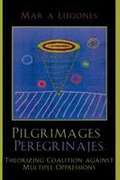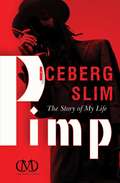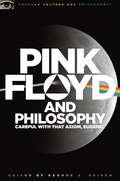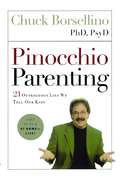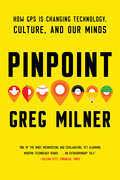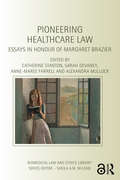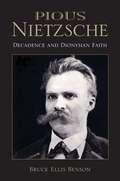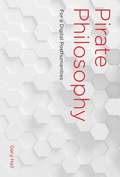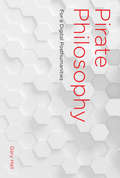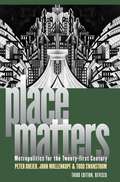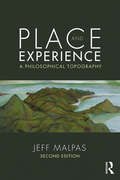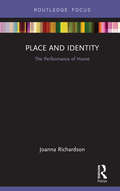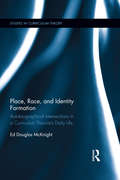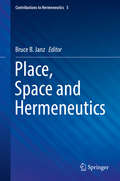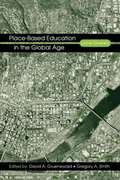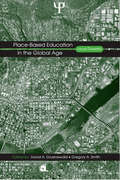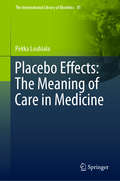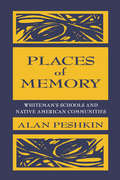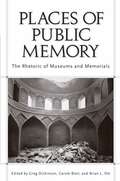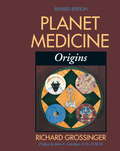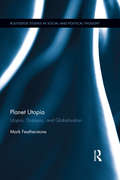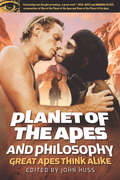- Table View
- List View
Pilgrimages/Peregrinajes: Theorizing Coalition Against Multiple Oppressions (Feminist Constructions Series)
by María LugonesThe author has collected some of her most famous essays, as well as some lesser-known gems, in this book. She writes from her own perspective as an inhabitant of a number of different 'worlds.' Born in Argentina but living for a number of years in the United States, she sees herself as neither quite a U.S. citizen, nor quite an Argentine. An activist against the oppression of Latino/a people by the dominant U.S. culture, she is also an academic participating in the privileges of that culture. A lesbian, she experiences homophobia in both Anglo and Latino world. A woman, she moves uneasily in the world of patriarchy. She writes out of multiple and conflicting subjectivities that shape her sense of who she is, resisting the demand for a unified self in light of her necessary ambiguities. The book explores the possibility of deep coalition with other women of color, based on 'multiple understandings of oppressions and resistances'―understandings whose logic she subjects to philosophical investigation.
Pimp: The Story of My Life (Sapphire Presents Ser.)
by Iceberg SlimBefore Hip Hop, there was the pimp. The book that brought black literature to the streets is back to show the Hip Hop generation what it's all about, where they came from. By telling the story of one man's struggles and triumphs in an underground world, this book shows the game doesn't change - it just has a different swagger. Iceberg Slim's story is now depicted in a major motion picture distributed worldwide. Iceberg Slim: Portrait of a Pimp shows Slim's transformation from pimp to the author of 7 classic books.As real as you can get without jumping in, this is the story of Slim's life as he saw, felt, tasted, and smelled it. Only he could tell this story and make the reader feel it. If you thought Hustle & Flow was the true pimp story, this book is where it all began. This is the heyday of the pimp, the hard-won pride and glory, small though it may be; the beginnings of pimp before it was dragged in front of the camera, before pimp juice and pimp style. A trip through hell by one man who lived to tell the tale. The dangers of jail, addiction and death that are still all too familiar for today's black community. Though it is a tale of his times, it will remain current and true for as long as there is a race bias, as long as there is a street life, as long as there is exploitation.
Pink Floyd and Philosophy
by George A. ReischWith their early experiments in psychedelic rock music in the 1960s, and their epic recordings of the 1970s and '80s, Pink Floyd became one of the most influential and recognizable rock bands in history. As "The Pink Floyd Sound," the band created sound and light shows that defined psychedelia in England and inspired similar movements in the Jefferson Airplane's San Francisco and Andy Warhol's New York City. The band's subsequent recordings forged rock music's connections to orchestral music, literature, and philosophy. "Dark Side of the Moon" and "The Wall" ignored pop music's ordinary topics to focus on themes such as madness, existential despair, brutality, alienation, and socially induced psychosis. They also became some of the best-selling recordings of all time.In this collection of essays, sixteen scholars expert in various branches of philosophy set the controls for the heart of the sun to critically examine the themes, concepts, and problems-usually encountered in the pages of Heidegger, Foucault, Sartre, or Orwell-that animate and inspire Pink Floyd's music. These include the meaning of existence, the individual's place in society, the interactions of knowledge and power in education, the contradictions of art and commerce, and the blurry line-the tragic line, in the case of Floyd early member Syd Barrett (died in 2006)-between genius and madness. Having dominated pop music for nearly four decades, Pink Floyd's dynamic and controversial history additionally opens the way for these authors to explore controversies about intellectual property, the nature of authorship, and whether wholes-especially in the case of rock bands-are more than the sums of their parts.
Pink: The History of a Color (The History of a Color)
by Michel PastoureauFrom the acclaimed author of Blue and other color histories, the beautifully illustrated story of pink, from the first ancient pigments to BarbiePink has such powerful associations today that it&’s hard to imagine the color could ever have meant anything different. But it&’s only since the introduction of the Barbie doll in 1959 that pink has become decisively feminized. Indeed, in the eighteenth century, pink was frequently masculine, and the color has signified many things beyond gender over the course of its long history—from the prim to the vulgar, and from the romantic to the eccentric. In this richly illustrated book, Michel Pastoureau, a celebrated authority on the history of colors, presents a fascinating visual, social, and cultural history of pink in the West, from antiquity to today.Pink pigments first appear in ancient Macedonian paintings, but it was not until the eighteenth century that vivid, saturated pinks were developed for dyeing and painting. At the same time, a popular new flower—the pink rose—finally gave the color a standard name, and pink, assuming a place in everyday life, began to acquire its own symbolism, distinct from that of red, yellow, or white. Bringing the story up to the twentieth and twenty-first centuries, Pink describes how the color, both adored and detested, became associated with many other things, from softness and pleasure to nudity and sex.Illustrated throughout with a wealth of captivating images, Pink is an entertaining and enlightening account of the evolving role and significance of the color in art, fashion, literature, religion, science, and everyday life across the millennia.
Pinocchio Parenting: 21 Outrageous Lies We Tell Our Kids
by Chuck BorsellinoAre you a Pinocchio Parent? You may be asking yourself these very questions: What lies, clichés, and half-truths do I tell my children? How do these lies hurt my children and my relationship with them? Clinical psychologist and author Chuck Borsellino claims that our culture condones all sorts of lies -- from "tiny fibs" to calloused misrepresentations. Though well-intentioned in our unintentional lies, we set our children up for failure and disappointment and undercut our credibility. In the pages of this book, Dr. Chuck Borsellino helps you sort out fact from fiction, intention from outcome. Most important, you'll learn a better way -- a way to help your children live life within the bounds of reality while fully exploring the dreams of their heart.
Pinpoint: How Gps Is Changing Technology, Culture, And Our Minds
by Greg MilnerPinpoint tells the story of GPS, a scientific marvel that enables almost all modern technology--but is changing us in profound ways. Over the last fifty years, humanity has developed an extraordinary shared utility: the Global Positioning System. Even as it guides us across town, GPS helps land planes, route mobile calls, anticipate earthquakes, predict weather, locate oil deposits, measure neutrinos, grow our food, and regulate global finance. It is as ubiquitous and essential as another Cold War technology, the Internet. In Pinpoint, Greg Milner takes us on a fascinating tour of a hidden system that touches almost every aspect of our modern life. While GPS has brought us breathtakingly accurate information about our planetary environment and physical space, it has also created new forms of human behavior. We have let it saturate the world's systems so completely and so quickly that we are just beginning to confront the possible consequences. A single GPS timing flaw, whether accidental or malicious, could bring down the electrical grid, hijack drones, or halt the world financial system. The use, and potential misuse, of GPS data by government and corporations raise disturbing questions about ethics and privacy. GPS may be altering the nature of human cognition--possibly even rearranging the gray matter in our heads. Pinpoint tells the sweeping story of GPS from its conceptual origins as a bomb guidance system to its presence in almost everything we do. Milner examines the different ways humans have understood physical space, delves into the neuroscience of cognitive maps, and questions GPS's double-edged effect on our culture. A fascinating and original story of the scientific urge toward precision, Pinpoint offers startling insight into how humans understand their place in the world.
Pioneering Healthcare Law: Essays in Honour of Margaret Brazier (Biomedical Law and Ethics Library)
by Anne-Maree Farrell Alexandra Mullock Catherine Stanton Sarah DevaneyThis book celebrates Professor Margaret Brazier’s outstanding contribution to the field of healthcare law and bioethics. It examines key aspects developed in Professor Brazier’s agenda-setting body of work, with contributions being provided by leading experts in the field from the UK, Australia, the US and continental Europe. They examine a range of current and future challenges for healthcare law and bioethics, representing state-of-the-art scholarship in the field. The book is organised into five parts. Part I discusses key principles and themes in healthcare law and bioethics. Part II examines the dynamics of the patient–doctor relationship, in particular the role of patients. Part III explores legal and ethical issues relating to the human body. Part IV discusses the regulation of reproduction, and Part V examines the relationship between the criminal law and the healthcare process. Offering a collaborative review of key and innovative themes in the field, the book will be of great interest and use to academics and students working in healthcare law and bioethics, and those working in health policy, law and regulation at both national and international levels. Chapter 10 of this book is freely available as a downloadable Open Access PDF at www.tandfebooks.com/openaccess. It has been made available under a Creative Commons Attribution-Non Commercial-No Derivatives 3.0 license.
Pious Nietzsche: Decadence and Dionysian Faith (Indiana Series in the Philosophy of Religion )
by Bruce Ellis BensonBruce Ellis Benson puts forward the surprising idea that Nietzsche was never a godless nihilist, but was instead deeply religious. But how does Nietzsche affirm life and faith in the midst of decadence and decay? Benson looks carefully at Nietzsche's life history and views of three decadents, Socrates, Wagner, and Paul, to come to grips with his pietistic turn. Key to this understanding is Benson's interpretation of the powerful effect that Nietzsche thinks music has on the human spirit. Benson claims that Nietzsche's improvisations at the piano were emblematic of the Dionysian or frenzied, ecstatic state he sought, but was ultimately unable to achieve, before he descended into madness. For its insights into questions of faith, decadence, and transcendence, this book is an important contribution to Nietzsche studies, philosophy, and religion.
Pirate Philosophy: For a Digital Posthumanities
by Gary HallIn Pirate Philosophy, Gary Hall considers whether the fight against the neoliberal corporatization of higher education in fact requires scholars to transform their own lives and labor. Is there a way for philosophers and theorists to act not just for or with the antiausterity and student protestors -- "graduates without a future" -- but in terms of their political struggles? Drawing on such phenomena as peer-to-peer file sharing and anticopyright/pro-piracy movements, Hall explores how those in academia can move beyond finding new ways of thinking about the world to find instead new ways of being theorists and philosophers in the world.Hall describes the politics of online sharing, the battles against the current intellectual property regime, and the actions of Anonymous, LulzSec, Aaron Swartz, and others, and he explains Creative Commons and the open access, open source, and free software movements. But in the heart of the book he considers how, when it comes to scholarly ways of creating, performing, and sharing knowledge, philosophers and theorists can challenge not just the neoliberal model of the entrepreneurial academic but also the traditional humanist model with its received ideas of proprietorial authorship, the book, originality, fixity, and the finished object. In other words, can scholars and students today become something like pirate philosophers?
Pirate Philosophy: For a Digital Posthumanities (Leonardo)
by Gary HallHow philosophers and theorists can find new models for the creation, publication, and dissemination of knowledge, challenging the received ideas of originality, authorship, and the book. In Pirate Philosophy, Gary Hall considers whether the fight against the neoliberal corporatization of higher education in fact requires scholars to transform their own lives and labor. Is there a way for philosophers and theorists to act not just for or with the antiausterity and student protestors—“graduates without a future”—but in terms of their political struggles? Drawing on such phenomena as peer-to-peer file sharing and anticopyright/pro-piracy movements, Hall explores how those in academia can move beyond finding new ways of thinking about the world to find instead new ways of being theorists and philosophers in the world.Hall describes the politics of online sharing, the battles against the current intellectual property regime, and the actions of Anonymous, LulzSec, Aaron Swartz, and others, and he explains Creative Commons and the open access, open source, and free software movements. But in the heart of the book he considers how, when it comes to scholarly ways of creating, performing, and sharing knowledge, philosophers and theorists can challenge not just the neoliberal model of the entrepreneurial academic but also the traditional humanist model with its received ideas of proprietorial authorship, the book, originality, fixity, and the finished object. In other words, can scholars and students today become something like pirate philosophers?
Place Experience of the Sacred: Silence and the Pilgrimage Topography of Mount Athos
by Christos KakalisThis book explores the topography of Mount Athos, emphasizing the significance of silence and communal ritual in its understanding. Mount Athos, a mountainous peninsula in northern Greece, is a valuable case study of sacred topography, as it is one of the world’s largest monastic communities and an important pilgrimage destination. Its phenomenological examination highlights the importance of embodiment in the experience of religious places. Combining interdisciplinary insights from architectural theory, philosophy, theology and anthropology with archival and ethnographic materials, the book brings a fresh contribution to both Athonite studies and scholarship on sacred space. By focusing on the interrelation between silence and communal ritual, it offers an alternative to the traditional art historical, objectifying approaches. It reintroduces the phenomenological understanding of place, investigating also how this is expressed through a number of narratives, such as travel literature, maps and diaries.
Place Matters: Metropolitics For The Twenty-first Century
by Peter Dreier John Mollenkopf Todd SwanstromHow can the United States create the political will to address our major urban problems--poverty, unemployment, crime, traffic congestion, toxic pollution, education, energy consumption, and housing, among others? That's the basic question addressed by the new edition of this award-winning book. Thoroughly revised and updated for its third edition, Place Matters examines the major trends and problems shaping our cities and suburbs, explores a range of policy solutions to address them, and looks closely at the potential political coalitions needed to put the country's "urban crisis" back on the public agenda. The problem of rising inequality is at the center of Place Matters. During the past several decades, the standard of living for the American middle class has stagnated, the number of poor people has reached its highest level since the 1960s, and the super-rich have dramatically increased their share of the nation's wealth and income. At the same time, Americans have grown further apart in terms of where they live, work, and play. This trend--economic segregation--no longer simply reflects the racial segregation between white suburbs and minority cities. In cities and suburbs alike, poor, middle class, and wealthy Americans now live in separate geographic spaces. The authors have updated the case studies and examples used to illustrate the book's key themes, incorporated the latest Census data, and drawn on exit polls and other data to examine the voting patterns and outcomes of the 2012 elections. They have expanded their discussion of how American cities are influenced by and influence global economic and social forces and how American cities compare with their counterparts in other parts of the world. And they draw upon the latest research and case studies not only to examine the negative impacts of income inequality and economic segregation, but also assess the efforts that civic and community groups, unions, business, and government are making to tackle them. Fully up to date and far richer and more provocative, this new version surpasses its previous editions and will continue to be an essential volume for all who study urban politics and care about our cities.
Place and Experience: A Philosophical Topography
by Jeff MalpasThe first edition of Place and Experience established Jeff Malpas as one of the leading philosophers and thinkers of place and space and provided a creative and refreshing alternative to prevailing post-structuralist and postmodern theories of place. It is a foundational and ground-breaking book in its attempt to lay out a sustained and rigorous account of place and its significance. The main argument of Place and Experience has three strands: first, that human being is inextricably bound to place; second, that place encompasses subjectivity and objectivity, being reducible to neither but foundational to both; and third that place, which is distinct from, but also related to space and time, is methodologically and ontologically fundamental. The development of this argument involves considerations concerning the nature of place and its relation to space and time; the character of that mode of philosophical investigation that is oriented to place and that is referred to as ‘philosophical topography’; the nature of subjectivity and objectivity as inter-related concepts that also connect with intersubjectivity; and the way place is tied to memory, identity, and the self. Malpas draws on a rich array of writers and philosophers, including Wordsworth, Kant, Proust, Heidegger and Donald Davidson. This second edition is revised throughout, including a new chapter on place and technological modernity, especially the seeming loss of place in the contemporary world, and a new Foreword by Edward Casey. It also includes a new set of additional features, such as illustrations, annotated further reading, and a glossary, which make this second edition more useful to teachers and students alike.
Place and Identity: The Performance of Home (Routledge Focus on Housing and Philosophy)
by Joanna RichardsonThe UK is experiencing a housing crisis unlike any other. Homelessness is on the increase and more people are at the mercy of landlords due to unaffordable housing. Place and Identity: Home as Performance highlights that the meaning of home is not just found within the bricks and mortar; it is constructed from the network of place, space and identity and the negotiation of conflict between those – it is not a fixed space but a link with land, ancestry and culture. This book fuses philosophy and the study of home based on many years of extensive research. Richardson looks at how the notion of home, or perhaps the lack of it, can affect identity and in turn the British housing market. This book argues that the concept of ‘home’ and physical housing are intrinsically linked and that until government and wider society understand the importance of home in relation to housing, the crisis is only likely to get worse. This book will be essential reading for postgraduate students whose interest is in housing and social policy, as well as appealing to those working in the areas of implementing and changing policy within government and professional spaces.
Place, Race, and Identity Formation: Autobiographical Intersections in a Curriculum Theorist's Daily Life (Studies in Curriculum Theory Series)
by Ed Douglas McKnightIn this work of curriculum theory, Ed Douglas McKnight addresses and explores the intersections between place (with specific discussion of Kincheloe’s and Pinar’s conceptualization of place and identity) and race (specifically Winthrop Jordan’s historical analysis of race as an Anglo-European construction that became the foundation of a white mythos). To that end, he employs a form of narrative construction called curriculum vitae (course of life)—a method of locating and delineating identity formation which addresses how theories of place, race and identity formation play out in a particular concrete life. By working through how place racializes identity and existence, the author engages in a long Southern tradition of storytelling, but in a way that turns it inside out. Instead of telling his own story as a means to romanticize the sins of the southern past, he tells a new story of growing up within the "white" discourse of the Deep South in the 1960s and 70s, tracking how his racial identity was created and how it has followed him through life. Significant in this narrative is how the discourse of whiteness and place continues to express itself even within the subject position of a curriculum theorist teaching in a large Deep South university. The book concludes with an elaboration on the challenges of engaging in the necessary anti-racist complicated conversation within education to begin to work through and cope with heavy racialized inheritances.
Place, Space and Hermeneutics (Contributions To Hermeneutics Ser. #5)
by Bruce B. JanzThis book analyzes the hermeneutics of place, raising questions about central issues such as textuality, dialogue, and play. It discusses the central figures in the development of hermeneutics and place, and surveys disciplines and areas in which a hermeneutic approach to place has been fruitful. It covers the range of philosophical hermeneutic theory, both within philosophy itself as well as from other disciplines. In doing so, the volume reflects the state of theorization on these issues, and also looks forward to the implications and opportunities that exist. Philosophical hermeneutics has fundamentally altered philosophy's approach to place. Issues such as how we dwell in place, how place is imagined, created, preserved, and lost, and how philosophy itself exists in place have become central. While there is much research applying hermeneutics to place, there is little which both reflects on that heritage and critically analyzes a hermeneutic approach to place. This book fills that void by offering a sustained analysis of the central elements, major figures, and disciplinary applications of hermeneutics and place.
Place- and Community-based Education in Schools
by David Sobel Gregory A. SmithPlace- and community-based education – an approach to teaching and learning that starts with the local – addresses two critical gaps in the experience of many children now growing up in the United States: contact with the natural world and contact with community. It offers a way to extend young people’s attention beyond the classroom to the world as it actually is, and to engage them in the process of devising solutions to the social and environmental problems they will confront as adults. This approach can increase students’ engagement with learning and enhance their academic achievement. Envisioned as a primer and guide for educators and members of the public interested in incorporating the local into schools in their own communities, this book explains the purpose and nature of place- and community-based education and provides multiple examples of its practice. The detailed descriptions of learning experiences set both within and beyond the classroom will help readers begin the process of advocating for or incorporating local content and experiences into their schools.
Place-Based Education in the Global Age: Local Diversity
by Gregory A. Smith David A. GruenewaldThe book is a collection of success stories from around the United States and explores some of the reasons for pursuing place-based education.It shows how educators from diverse places are using place as a focal point for developing community leaders, understanding the tensions between Israel and Palestine, and for showing future teachers the power of place-based learning.
Place-Based Education in the Global Age: Local Diversity
by Gregory A. Smith David A. Gruenewald"Polished, clear, insightful, and meaningful.... This volume amounts to nothing less than a complete rethinking of what progressive education can be at its best and how education can be reconceptualized as one of the central practices of a genuinely democratic and sustainable society.... It is the kind of book that has the potential to be transformative." Stephen Preskill, University of New Mexico "The editors and contributors are pioneers in the field of educational theory, policy, and philosophy.... They are opening new areas of inquiry and educational reform in ways that promise to make this book in very short time into a classic.... The practical applications and experiments included reveal the richness of grassroots initiatives already underway to bring educational theory and policy down to earth. While spanning the richest and deepest intellectual ideas and concepts, the stories told are the types that practitioners and teachers will be able to relate to in their daily undertakings." Madhu Suri Prakash, The Pennsylvania State University This volume – a landmark contribution to the burgeoning theory and practice of place-based education – enriches the field in three ways: First, it frames place-based pedagogy not just as an alternative teaching methodology or novel approach to environmental education but as part of a broader social movement known as the "Anew localism", which aims toward reclaiming the significance of the local in the global age. Second, it links the development of ecological awareness and stewardship to concerns about equity and cultural diversity. Third, it presents examples of place-based education in action. The relationship between the new localism and place-based education is clarified and the process of making connections between learners and their wider communities is demonstrated. The book is organized around three themes: Reclaiming Broader Meanings of Education; Models for Place-Based Learning; and Global Visions of the Local in Higher Education This is a powerfully relevant volume for researchers, teacher educators, and students across the fields of curriculum theory, educational foundations, critical pedagogy, multicultural education, and environmental education.
Placebo Effects: The Meaning of Care in Medicine (The International Library of Bioethics #81)
by Pekka LouhialaThis book provides a perspective on the concepts placebo and placebo effects, which has been missing so far: a detailed analysis of the history of the terms, their current use, suggested alternatives and the implications of the conceptual confusion. Everybody knows something about placebos and placebo effects. If, however, people are asked to define the concepts, the spectrum becomes wide. Does 'placebo' refer to an inert treatment or does it cover all elements of the patient-physician-interaction except for pharmacological or other physiological mechanisms? Furthermore, if, by definition, a placebo has no effect, what sense does it make to talk about a 'placebo effect'? Even in scientific literature the concepts ‘placebo’ and ‘placebo effect’ are used in many senses and often in a confusing way. While this book discusses many issues which keep puzzling physicians, it also covers the historical developments of the concepts of placebo and placebo effect as well as the conceptual confusion in the definitions. This book is intended for physicians, philosophers, psychologists and any other people interested in placebos, placebo effects and the physician-patient relationship.
Places of Memory: Whiteman's Schools and Native American Communities (Sociocultural, Political, and Historical Studies in Education)
by Alan PeshkinWhile visiting New Mexico, the author was struck with the opportunity the state presents to explore the school-community relationship in rural, religious, and multiethnic sociocultural settings. In New Mexico, the school-community relationship can be learned within four major culture groups -- Indian, Spanish-American, Mexican, and Anglo. Together, studies of these culture groups form a portrait of schooling in New Mexico, further documenting the range of ways that host communities in our educationally decentralized society use the prerogatives of local control to "create" schools that fit local cultural inclinations. The first of four planned volumes, this book studies the Pueblo Indians and Indian High School. The school is a nonpublic, state-accredited, off-reservation boarding school for more than 400 Indian students. A large majority of the students are from Pueblo tribes, while others are from Navajo and Apache tribes. As a state-accredited school, it subscribes to curricular, safety, and other requirements of New Mexico. As a nonpublic school devoted to Indian students, it has the prerogative to be as distinctive as the ethnic group it serves. USE SHORT BLURB COPY FOR CATALOGS: This ethnography of the Pueblo Indians and Indian High School epxlores some of the ways that host communities in our decentralized society use the perogatives of local consul to create schools that fit local cultural inclinations.
Places of Public Memory: The Rhetoric of Museums and Memorials (Rhetoric, Culture, and Social Critique)
by Carole Blair Brian L. Ott Greg Dickinson<p>Though we live in a time when memory seems to be losing its hold on communities, memory remains central to personal, communal, and national identities. And although popular and public discourses from speeches to films invite a shared sense of the past, official sites of memory such as memorials, museums, and battlefields embody unique rhetorical principles. <p>Places of Public Memory: The Rhetoric of Museums and Memorials is a sustained and rigorous consideration of the intersections of memory, place, and rhetoric. From the mnemonic systems inscribed upon ancient architecture to the roadside accident memorials that line America's highways, memory and place have always been deeply interconnected. This book investigates the intersections of memory and place through nine original essays written by leading memory studies scholars from the fields of rhetoric, media studies, organizational communication, history, performance studies, and English. The essays address, among other subjects, the rhetorical strategies of those vying for competing visions of a 9/11 memorial at New York City's Ground Zero; rhetorics of resistance embedded in the plans for an expansion of the National Civil Rights Museum; representations of nuclear energy both as power source and weapon in Cold War and post Cold War museums; and tours and tourism as acts of performance. <p>By focusing on official places of memory, the collection causes readers to reflect on how nations and local communities remember history and on how some voices and views are legitimated and others are minimized or erased.</p>
Planet Medicine: Origins, Revised Edition
by John E. Upledger Richard GrossingerPlanet Medicine is a major work by an anthropologist who looks at medicine in a broad context. In this edition, additions to this classic text include a section on Reiki, a comparison of types of palpation used in healing, updates on craniosacral therapy, and a means of understanding how different alternative medicines actually work. Illustrated throughout, this is the standard on the history, philosophy, and anthropology of this subject.
Planet Utopia: Utopia, Dystopia, and Globalisation (Routledge Studies in Social and Political Thought)
by Mark FeatherstoneThe key figure of the capitalist utopia is the individual who is ultimately free. The capitalist’s ideal society is designed to protect this freedom. However, within Planet Utopia: Utopia, Dystopia, Globalisation, Featherstone argues that capitalist utopian vision, which is most clearly expressed in theories of global finance, is no longer sustainable today. This book concerns the status of utopian thinking in contemporary global society and the possibility of imagining alternative ways of living outside of capitalism. Using a range of sociological and philosophical theories to write the first intellectual history of the capitalist utopia in English, Featherstone provokes the reader into thinking about ways of moving beyond this model of organising social life through sociological modes of thought. Indeed, this enlightening volume seeks to show how utopian thinking about the way people should live has been progressively captured by capitalism with the result that it is difficult to imagine alternatives to capitalist society today. Presenting sociology and sociological thinking as a utopian alternative to the capitalist utopia, Planet Utopia will appeal to postgraduate and postdoctoral students interested in subjects including Sociology, Social Theory, Cultural Studies, Cultural Theory and Continental Philosophy.
Planet of the Apes and Philosophy: Great Apes Think Alike
by John HussWhat makes humans different from other animals, what humans are entitled to do to other species, whether time travel is possible, what limits should be placed on science and technology, the morality and practicality of genetic engineering-these are just some of the philosophical problems raised by Planet of the Apes.<P><P>Planet of the Apes and Philosophy looks at all the deeper issues involved in the Planet of the Apes stories. It covers the entire franchise, from Pierre Boulle's 1963 novel Monkey Planet to the successful 2012 reboot Rise of the Planet of the Apes. The chapters reflect diverse points of view, philosophical, religious, and scientific.The ethical relations of humans with animals are explored in several chapters, with entertaining and incisive observations on animal intelligence, animal rights, and human-animal interaction. Genetic engineering is changing humans, animals, and plants, raising new questions about the morality of such interventions. The scientific recognition that humans and chimps share 99 percent of their genes makes a future in which non-human animals acquire greater importance a distinct possibility.Planet of the Apes is the most resonant of all scientific apocalypse myths.
